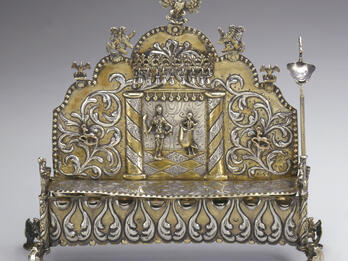Be’er sheva (Well of the Oath)
One must know that man possesses a greater virtue than the beast, because a beast also has in it the breath of life and likewise has the intelligence to eat and drink, and the desire to lie with the female, and has mercy on the children that it bore, and fears for its life; thus it ensures that it does not fall into the water or else, in other places where it thinks that it may meet its end, so it flees from there. However, it has no understanding of how to control itself and why it should control itself, and it does not know who created it and how to beg for its life, and when it dies, its breath returns to the earth and becomes nothing.
Man is not like this. He has within him the virtue of the angels—this is the divine soul, that speaks from within him, gives him wisdom, and instills in him understanding. Likewise, one must therefore understand that the soul is like a gemstone before it is polished. It looks like other simple stones, but when it has been polished it shines with great brilliance, is valuable and greatly admired. This soul of man is on a high level, yet is dirtied by the characteristics of the beast, i.e., regarding food and drink and other things that we wrote about in relation to the beast. And together with this, when a person performs the commandments to which he is accustomed, for example, he knows that on the Sabbath he must go to the synagogue, that on Yom Kippur he must fast, because he saw it and is used to doing it; otherwise, he thinks that he is not a householder or even a Jew. Although this is good, nevertheless his soul is not polished or purified because he acts as he is accustomed to acting, like a beast which is used to plowing and does not know why it plows. However, he who seeks to discover the reason for the commandments, and why God created him, is called a wise man who has polished his soul, as the verse says: And they that are wise shall shine as the brightness of the firmament; and they that turn the many to righteousness as the stars forever, etc. (Daniel 12:3).
For every single soul which comes to the door of the Garden of Eden, two angels stand at the door and stop the soul and ask what it desires to do therein. And it answers, “I want to praise God here with the other saints who sit here before God, happy and serene with their elders.” And they [the angels] ask it, “What kind of merit will be your advocate, that you should be allowed to enter? Do you have the merit of the Torah that you learned? Or have you helped others to learn and ensured that others studied? Then we will let you in.” And the soul answers, “My father and mother are responsible for not letting me learn, so what should I do about it?” And the angels respond, “Why did you not go to the great scholars who are full of Torah, even though they are trampled and repudiated by the proud people, and ask them to teach you—or go to your shepherds, that is, the rabbis that are appointed in the communities, and have them give you a teacher. Because you have no merit from the Torah, so we must not allow you to enter.”
However, the soul that has the merit of the Torah, they open the door widely before it and cry out, “Open all doors in the Garden of Eden and let the righteous man or woman with the merit of Torah enter.” And when the soul enters, they shout out once again, “Give honor to the man whom God wishes to honor, give him a place according to his merit.” Happy is he who obtains this; about him it is said: “Your good will go before you, and you will obtain God’s honor and long life in this world and in the world to come. Happy shalt thou be, and it shall be well with thee (Psalms 128:2).” Amen, selah.
Translated by
.
Published in: The Posen Library of Jewish Culture and Civilization, vol. 5.



